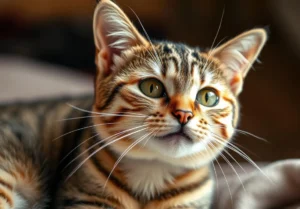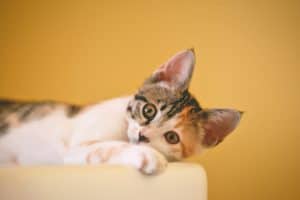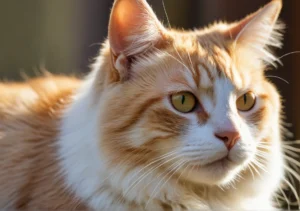Cats seem to be irresistibly drawn to the sound of kissy noises, but have you ever wondered why? In this blog post, we will explore the fascinating reasons behind why cats are attracted by kissy noises.
The Curious Attraction: Exploring Why Cats Love Kissy Noises
Feline Auditory Sensitivity
Cats have incredible auditory abilities that far surpass humans. Their ears are finely-tuned to pick up even the slightest sounds, which is why they can hear frequencies up to 64,000 Hz compared to our 20,000 Hz. When you make kissy noises, the high-pitched tones may catch their attention, as it’s in a range that is particularly stimulating to their ears. So, it’s not surprising that your cat is intrigued by those kissy sounds – you’re speaking their language in a way!
Mimicking Purring Sounds
Have you ever noticed how a cat’s purr can instantly soothe them? Well, kissy noises might just be hitting that same sweet spot for our feline friends. When we make those kissy sounds, the rhythmic nature of the noise can mimic the calming effect of a cat’s purr. It’s like we’re unknowingly tapping into a universal language of relaxation for cats. So next time you pucker up and make those noises, know that you might just be giving your cat a sense of comfort and security that comes naturally to them. And who knows, maybe they’ll return the favor with a gentle head-butt or a cozy nap on your lap.
Associative Conditioning
Cats have a clever way of associating things with positive experiences. It’s like when you hear your favorite song and instantly feel good, right? Well, in the case of kissy noises, your cat might have linked those sounds to receiving love, attention, or treats. So, when they hear those familiar kissing sounds, they may expect something good is coming their way. It’s like a little Pavlovian response, but with a feline twist.
Attention-Grabbing Behavior
Imagine being in a room full of chatter, and suddenly, someone calls your name. Your attention is instantly grabbed, right? Well, kissy noises can work similarly for cats. When you make those smoochy sounds, your kitty’s ears perk up, and they’re like, “Hey, what’s up?” It’s like a subtle way of saying, “Hey, I see you, and I’m here.” So, next time you want to catch your cat’s attention, try a little kissy noise – you might just get a charming feline visitor in no time.
Extra Tip: If your cat responds well to kissy noises, you can use this association to reinforce positive behaviors or encourage bonding. Just make sure to follow up those sounds with some love or treats to keep your kitty engaged and happy.
5. Evolutionary Factors
Have you ever wondered why your cat seems so intrigued by kissy noises? Well, part of the reason might lie in evolutionary factors. Cats, being natural hunters, are highly attuned to the sounds of potential prey. Kissy noises, with their quick, high-pitched tones, may mimic the sounds of small animals or birds, piquing your cat’s interest.
Another evolutionary reason could be related to social bonding. In the wild, cats rely on communication to establish and maintain relationships with other cats. By responding to certain sounds like kissy noises, cats may be displaying a behavior that strengthens their social connections, whether with other felines or with their human companions.
So next time your cat perks up at the sound of your kissy noises, remember that their keen interest could be rooted in their evolutionary past, where such sounds were crucial for survival and social cohesion.
6. Neurological Responses
When you make kissy noises and your cat seems to be drawn to the sound, it’s not just their ears picking up the sound – their brains are also getting in on the action. Neurologically speaking, cats have highly sensitive auditory systems, allowing them to detect a wide range of sounds, including those high-pitched kissy noises that humans make.
Research has shown that certain sounds can trigger a cat’s prey response, activating areas in their brain associated with hunting and capturing prey. So when your cat shows interest in kissy noises, it could be that these sounds are activating a primal instinct in them, making them more alert and engaged.
The next time you’re wondering why your cat can’t resist those kissy noises, remember that it’s not just their ears that are at work – it’s their brains responding to a sound that triggers their innate hunting instincts.
7. Other Sounds Cats Love
Cats are known for their sensitivity to sounds, and while kissy noises may grab their attention, there are other sounds they find equally enticing. Cats often respond well to high-pitched sounds like chirping or meowing, as these mimic the sounds of potential prey. Whistling or clicking noises can also pique their curiosity and engage their playful instincts. Playing ambient sounds like soft music or nature sounds can create a calming atmosphere for your feline friend, promoting relaxation and contentment. Remember, cats have individual preferences, so observe your cat’s reactions to different sounds to see what they respond to best.
8. Playful Responses
When you make kissy noises at your cat, you may notice them responding in playful ways. Cats might approach you with ears perked up, tail held high, or even start rubbing against you affectionately. Some cats may mimic the noises back at you, creating a fun interaction. Engage in play sessions with your cat after making kissy noises to strengthen your bond and provide mental stimulation. Use interactive toys like feathers or laser pointers to keep them entertained and active. Remember, positive interactions with your cat can enhance their overall well-being and strengthen your relationship with them.
Additional Insight: Most cats are drawn to kissy noises due to the high-frequency sound resembling the noises small prey animals make. This instinctual response may trigger your cat’s hunting instincts and playful behavior, making them more responsive to your affectionate sounds. Keep in mind that every cat has its unique preferences, so observe how your feline friend reacts to different sounds to tailor your interactions to their liking.
9. Trivia: Famous Feline Reactions
Have you ever wondered why cats react to kissy noises? Well, you’re not alone! In fact, famous felines like Lil Bub and Grumpy Cat have been known to respond to these sounds. Lil Bub, the internet sensation, would perk up and tilt her head curiously when her owner made kissy noises, while Grumpy Cat, known for her perpetually unimpressed expression, would often give a slight twitch of her ears in response. These reactions highlight the universal appeal of kissy noises among cats, showcasing how this behavior transcends individual quirks to become a common feline trait.
10. Expert Insights
Curious about why cats seem to be attracted to kissy noises? Animal behavior experts shed some light on this intriguing phenomenon. According to studies, cats are naturally drawn to high-pitched sounds, as they mimic the noises made by their prey. When you make kissy noises, you’re producing a sound that resonates with your cat’s instinctual hunting instincts, capturing their attention in a way that other sounds might not. Additionally, the repetitive nature of kissy noises can create a sense of rhythm and predictability for cats, making them more likely to respond to these familiar sounds. So next time you pucker up for your furry friend, remember that you’re tapping into their primal instincts in a playful way.
Extra tip: Consider incorporating different variations of kissy noises, such as short and quick pecks or long, drawn-out smooches, to see how your cat responds to each type. This experimentation can help you understand your cat’s preferences and strengthen your bond through interactive play.
11. Tips for Cat Owners
So, you want to bond with your feline friend using kissy noises? Here are some handy tips to incorporate this adorable interaction into your daily routine:
Start Slow: Introduce kissy noises gradually to gauge your cat’s reaction. Some cats may be instantly intrigued, while others might need time to warm up to the idea.
Use Positive Reinforcement: Pair your kissy noises with treats or pets to create a positive association. This will encourage your cat to enjoy and respond to the sound.
Respect Boundaries: Not all cats enjoy close contact or sounds in their face. Be mindful of your cat’s body language and signals to ensure they are comfortable with your affection.
Timing is Key: Choose moments when your cat is relaxed and receptive to your attention. Avoid forcing interactions or making loud noises that could startle your cat.
Consistency is Key: Establish a routine for using kissy noises so your cat can anticipate and engage with this form of communication regularly.
Remember, every cat is unique, so observe your furry companion’s reactions and adjust your approach accordingly. With patience and love, you’ll strengthen the bond between you and your cat through sweet kissy noises.
12. Fun Ways to Engage Your Cat
Looking for creative ways to entertain your beloved pet using kissy noises and other captivating sounds? Here are some engaging ideas to spice up your cat’s day:
Interactive Play: Incorporate kissy noises into play sessions with feather wands, laser pointers, or interactive toys to make the experience even more exciting for your cat.
DIY Sound Toys: Create homemade toys that produce interesting sounds when interacted with, such as crinkly paper balls or bells attached to a string. Your cat will love the auditory stimulation!
Puzzle Feeders: Combine kissy noises with mealtime by using puzzle feeders or treat-dispensing toys that make sounds when your cat successfully retrieves a treat. It’s a fun way to engage their hunting instincts.
Music Therapy: Play calming music or soothing sounds in the background while incorporating kissy noises into your interactions. This serene environment can help reduce stress and anxiety in your cat.
Outdoor Sounds: Open a window or play recordings of birds chirping or gentle wind rustling through leaves. The combination of natural sounds and your kissy noises will captivate your cat’s senses.
By integrating these fun and interactive activities into your daily routine, you’ll keep your cat mentally stimulated and entertained while strengthening your bond through the magic of kissy noises. Enjoy the playful moments with your furry friend!
Alex, a passionate animal lover, has experience in training and understanding animal behavior. As a proud pet parent to two dogs and three cats, he founded AnimalReport.net to share insights from animal experts and expand his knowledge of the animal kingdom.




